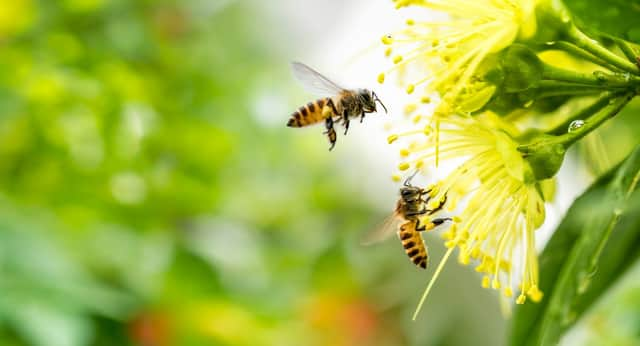A pesticide that is ‘harmful to bees’ has been approved for use in the UK - here’s why
This article contains affiliate links. We may earn a small commission on items purchased through this article, but that does not affect our editorial judgement.


A pesticide found to be poisonous to bees has been approved for use in the UK. The Government announced the authorisation, despite a European Union (EU)-wide ban and a two year old pledge to keep restrictions on the product in place.
The decision came after pressure from the National Farmers’ Union (NFU) and British Sugar, but the U-turn has angered conservationists and environmentalists.
Advertisement
Hide AdAdvertisement
Hide AdHarmful for young bees
The Department for Environment, Food and Rural Affairs (DEFRA) approved the use of a product containing a neonicotinoid called thiamethoxam for emergency use on sugar beet seeds throughout 2021 in England. Neonicotinoids are a class of neuro-active insecticides, chemically similar to nicotine.
According to the EU, neonics, which is part of the product, attack a central nervous system of pollinating insects, after the pesticide seeps into the flowers, roots, stems, and pollen of plants. Insects, like bees, are then paralysed and die.
Studies have found that thiamethoxam is particularly harmful for young bees, leading to a decline in the bee population.
In 2018, the EU agreed to ban the world’s most widely used insecticides from all fields because of the danger posed to bees.
Then Environment Secretary, Michael Gove, backed the widespread ban, saying: “The weight of evidence now shows the risks neonicotinoids pose to our environment, particularly to the bees and other pollinators which play such a key part in our £100 billion food industry, is greater than previously understood.”
Why has the Government approved the pesticide?
The Government has said that a year long relaxation on the ban of the pesticide would provide much needed relief for sugar beet farms, after aster yellows disease affected crop yields in 2020. Aster yellows is a chronic plant disease that affects both vegetables and flowers.
In answer to a letter from NFU members to Environment Secretary, George Eustice, urging for the need to use the neonicotinoid called Cruiser SB in England, government ministers agreed to the “limited and controlled” use of the pesticide for 120 days.
The UK has joined 11 countries, including Denmark, Belgium and Spain, and signed emergency authorisation for the pesticide’s use.
Advertisement
Hide AdAdvertisement
Hide AdChairman of the NFU sugar board, Michael Sly, said he was relieved the application was granted.
He said: ”Any treatment will be used in a limited and controlled way on sugar beet, a non-flowering crop, and only when the scientific threshold has been independently judged to have been met.
“This authorisation is desperately needed to fight this disease. It will be crucial in ensuring that Britain’s sugar beet growers continue to have viable farm businesses.”
A DEFRA spokesperson said: “Emergency authorisations for pesticides are only granted in exceptional circumstances where diseases or pests cannot be controlled by any other reasonable means. Emergency authorisations are used by countries across Europe.
“Pesticides can only be used where we judge there to be no harm to human health and animal health, and no unacceptable risks to the environment. The temporary use of this product is strictly limited to a non-flowering crop and will be tightly controlled to minimise any potential risk to pollinators.”
‘We need urgent action’
In a Twitter post, The Wildlife Trusts has responded to the news, saying the decision is “bad news for bees”.
"Neonicotinoids pose a significant environmental risk - particularly to our bees and other pollinators - and over the last decade hundreds of thousands of people across the UK have called for better protection of our bees, and for these highly toxic pesticides to be banned,” Wildlife Trusts continued.
“We need urgent action to restore the abundance of our insect populations, not broken promises that make the ecological crisis even worse.”
Advertisement
Hide AdAdvertisement
Hide AdMatt Shardlow, the Chief Executive of the invertebrate conservation group, Buglife, said it was an “environmentally regressive” decision that would destroy wildflowers and add to an “onslaught” on insects.
Environmental activist Greta Thunberg criticised the UK’s government decisions, tweeting: “UK government has announced 'a bee-killing pesticide so poisonous that it is banned by the EU' may be used in England. New coal mines and pesticides... the UK's so-called 'green industrial revolution' is off to a great start. Very credible indeed."
A petition urging ministers not to reintroduce the pesticide has gained over 80,000 signatures.